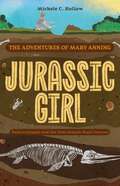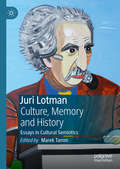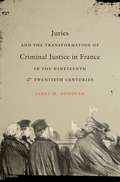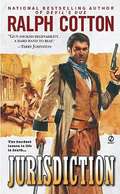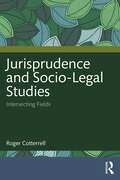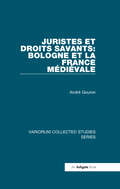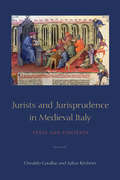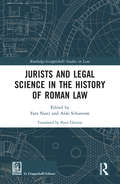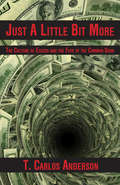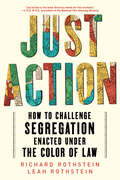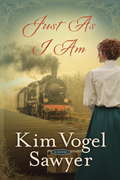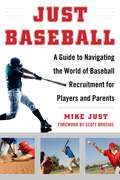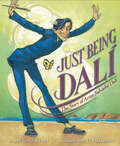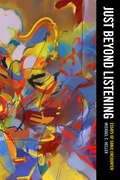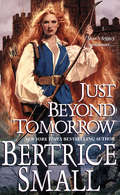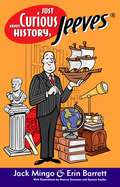- Table View
- List View
Juramento escocés
by Jimena CookUna novela medieval de romance y aventuras, misterio y traiciones. Dos almas gemelas destinadas a encontrarse, unidas por una alianza y un antiguo pacto: un juramento escocés. Los guardianes de Escocia se disgregan tras el asesinato de su jefe, Magnus MacLeod y su hija Daracha, la primogénita legítima del jefe del clan, a la que todo el mundo da por muerta. Sin embargo, la niña nunca murió, sino que fue adoptada por una familia británica muy cercana al rey Eduardo de Inglaterra. La vida de Daracha cambiará desde ese momento, será educada como una inglesa, odiando a los escoceses y sin saber su origen y la verdad sobre sus ascendencia. Haakon Macdonald, a unos días de celebrarse su boda con la heredera de uno de clanes escoceses más poderosos de las Tierras Altas, descubre que, después de muchos años de ignorancia, la joven MacLeod no ha muerto; es entonces cuando decide buscarla: es consciente de que su vida puede correr peligro si alguien más sabe de su existencia. Todo esto le llevará a dejar las Tierras Altas y adentrarse en territorio inglés para descubrir dónde se encuentra la misteriosa joven por la que ambos clanes sellaron con sangre un juramento escocés.
Jurassic Girl: The Adventures of Mary Anning, Paleontologist and the First Female Fossil Hunter (Dinosaur books for kids 8–12)
by Michele C. HollowDiscover the fascinating life of 12-year-old Mary Anning, a fossil hunter who would grow up to be a famous paleontologist, in this historical fiction book for children interested in learning about dinosaurs, fossils, and women in STEM, like Grace Hopper, Marie Curie, and Jane Goodall. At age 12, Mary Anning found the skeleton of the first ichthyosaurus, a fish-like creature that lived during the Jurassic Period. It was more than 17 feet long! But according to many of the men in London&’s Geological Society, the fossil could not be real due to several reasons: Mary was female. She was 12 years old. She had no formal education. She was poor. But that didn't stop Mary! This story follows her journey with the ichthyosaurus and offers a look into the childhood of someone who would eventually become the &“Mother of Paleontology.&” Featuring friendships, fossils, and found family, Mary Anning&’s tale is sure to inspire young readers and scientists alike!
Juri Lotman - Culture, Memory and History: Essays in Cultural Semiotics
by Marek TammThis volume brings together a selection of Juri Lotman’s late essays, published between 1979 and 1995. While Lotman is widely read in the fields of semiotics and literary studies, his innovative ideas about history and memory remain relatively unknown. The articles in this volume, most of which are appearing in English for the first time, lay out Lotman’s semiotic model of culture, with its emphasis on mnemonic processes. Lotman’s concept of culture as the non-hereditary memory of a community that is in a continuous process of self-interpretation will be of interest to scholars working in cultural theory, memory studies and the theory of history.
Juries and the Transformation of Criminal Justice in France in the Nineteenth and Twentieth Centuries
by James M. DonovanJames Donovan takes a comprehensive approach to the history of the jury in modern France by investigating the legal, political, sociocultural, and intellectual aspects of jury trial from the Revolution through the twentieth century. He demonstrates that these juries, through their decisions, helped shape reform of the nation's criminal justice system.From their introduction in 1791 as an expression of the sovereignty of the people through the early 1900s, argues Donovan, juries often acted against the wishes of the political and judicial authorities, despite repeated governmental attempts to manipulate their composition. High acquittal rates for both political and nonpolitical crimes were in part due to juror resistance to the harsh and rigid punishments imposed by the Napoleonic Penal Code, Donovan explains. In response, legislators gradually enacted laws to lower penalties for certain crimes and to give jurors legal means to offer nuanced verdicts and to ameliorate punishments. Faced with persistently high acquittal rates, however, governments eventually took powers away from juries by withdrawing many cases from their purview and ultimately destroying the panels' independence in 1941.
Jurisdiction (Ralph Cotton Western Series)
by Ralph CottonArizona Ranger Sam Burrack is on the trail of the Ganston Gang, who have rampaged across the state and murdered a fellow ranger. But young Billy Odle is riding with the outlaws-and Burrack has to keep him out of the crossfire...
Jurisprudence and Socio-Legal Studies: Intersecting Fields
by Roger CotterrellThis book presents a set of related studies aimed at showing key points of intersection and common interest between jurisprudence and socio-legal studies, which are otherwise typically considered distinct fields. It reflects and draws on the author’s work in these areas over more than four decades.The first half of the book explores theoretical issues surrounding the enterprise of socio-legal research, its current scope, and its historical traditions. Some chapters directly compare juristic theory and socio-legal inquiry. Chapters in Part II profile a selection of European jurists whose work offers important insights for socio-legal inquiry. Other chapters frame these studies, explore the history of interactions between jurisprudence and socio-legal research, and show points of convergence between these fields that are increasingly important today. A main aim of the book is to show the current urgency of linking and broadening juristic and social scientific interests in law.Internationally oriented, the book will be of interest to students and researchers in the areas of jurisprudence, legal philosophy, sociology of law, socio-legal studies, and comparative law. It is suitable as supplementary reading for courses in any of these subjects.
Juristes et droits savants: Bologne et la France Médiéval (Variorum Collected Studies)
by André GouronThis fourth collection by Professor André Gouron presents a set of twenty studies on jurisprudence, jurists and legal practice in the 12th and 13th centuries. The focus is on the schools and traditions of Bologna and in France, but the coverage includes canon, Roman and customary law. The first part deals with theories diffused by the jurists of Bologna and France and the literary genres in which they expressed these theories, particularly on questions of presumptions, proof, and illicit conditions. In the second section the author looks at some of the persons involved in the juridical renaissance of this period, and at some of the effects of the legal doctrines being taught on royal legislation, procedure, the fiscal system, and urban autonomy. Ce volume - le quatrième de l’auteur dans cette collection - réunit vingt articles du professeur Gouron. Onze de ces articles forment une première partie, consacrée aux théories diffusées par les juristes de Bologne ou de France et aux genres littéraires à travers lesquels s’expriment ces théories, notamment en matière de présomptions, de preuve par témoins ou de conditions illicites. La seconde partie du volume rassemble neuf articles qui traitent de divers acteurs, célèbres ou obscurs, de la renaissance juridique, ainsi que des effets des doctrines enseignées par les romanistes et les canonistes sur la législation royale, la procédure, le système fiscal et l’autonomie urbaine.
Jurists and Jurisprudence in Medieval Italy: Texts and Contexts (Toronto Studies in Medieval Law)
by Julius Kirshner Osvaldo CavallarJurists and Jurisprudence in Medieval Italy is an original collection of texts exemplifying medieval Italian jurisprudence, known as the ius commune. Translated for the first time into English, many of the texts exist only in early printed editions and manuscripts. Featuring commentaries by leading medieval civil law jurists, notably Azo Portius, Accursius, Albertus Gandinus, Bartolus of Sassoferrato, and Baldus de Ubaldis, this book covers a wide range of topics, including how to teach and study law, the production of legal texts, the ethical norms guiding practitioners, civil and criminal procedures, and family matters. The translations, together with context-setting introductions, highlight fundamental legal concepts and practices and the milieu in which jurists operated. They offer entry points for exploring perennial subjects such as the professionalization of lawyers, the tangled relationship between law and morality, the role of gender in the socio-legal order, and the extent to which the ius commune can be considered an autonomous system of law.
Jurists and Legal Science in the History of Roman Law (Routledge-Giappichelli Studies in Law)
by Fara NastiThis book provides a new approach to the study of the History of Roman Law. It collects the first results of the European Research Council Project, Scriptores iuris Romani - dedicated to a new collection of the texts of Roman jurisprudence, highlighting important methodological issues, together with innovative reconstructions of the profiles of some ancient jurists and works. Jurists were great protagonists of the history of Rome, both as producers and interpreters of law, since the Republican Age and as collaborators of the principes during the Empire. Nevertheless, their role has been underestimated by modern historians and legal experts for reasons connected to the developments of Modern Law in England and in Continental Europe. This book aims to address this imbalance. It presents an advanced paradigm in considering the most important aspects of Roman law: the Justinian Digesta, and other juridical late antique anthologies. The work offers an historiographic model which overturns current perspectives and makes way for a different path for legal and historical studies. Unlike existing literature, the focus is not on the Justinian Codification, but on the individualities of ancient Roman Jurists. As such, it presents the actual legal thought of its experts and authors: the ancient iuris prudentes. The book will be of interest to researchers and academics in Classics, Ancient History, History of Law, and contemporary legal studies.
Jury of One
by Mignon G. EberhartMarriage to her hometown prince turns terrifying when the bride realizes he’s a murderer—and she’s his next victim in this classic romantic thriller.Maggy Warren’s return to the small town of Milrock is the stuff of fairy tales. After growing up an only child of a widowed mother in the shadow of the wealthy, glittering Beall family, Maggy is to be married to Kirk Beall, eldest son and heir to the family business empire. Days before the wedding, her childhood friend and protector Josh Mason returns from military service, warning Maggy to call off the wedding. Is it out of jealousy—or does he detect something sinister in Kirk? Soon enough, a man is dead after what appears to be an accident. But as the body count rises, Maggy is certain her dream come true is really a nightmare.
Jus Post Bellum and Transitional Justice
by Larry May Elizabeth EdenbergThis collection of essays brings together jus post bellum and transitional justice theorists to explore the legal and moral questions that arise at the end of war and in the transition to less oppressive regimes. Transitional justice and jus post bellum share in common many concepts that will be explored in this volume. In both transitional justice and jus post bellum, retribution is crucial. In some contexts criminal trials will need to be held, and in others truth commissions and other hybrid trials will be considered more appropriate means for securing some form of retribution. But there is a difference between how jus post bellum is conceptualized, where the key is securing peace, and transitional justice, where the key is often greater democratization. This collection of essays highlights both the overlap and the differences between these emerging bodies of scholarship and incipient law.
Just A Little Bit More: The Culture of Excess and the Fate of the Common Good
by T. Carlos AndersonIs America a Christian Nation? According to author T. Carlos Andersen, the true religion of the land is the confluence of commerce, materialism, and consumerism. Andersen, defining religion as "ultimate concern," claims our true devotion is found in material pursuits. It's been a good religion; it has fed, clothed, sheltered, and employed millions of Americans. It can go too far, however. When these pursuits become excessive, the religion breaks bad and the common good suffers.
Just Action: How to Challenge Segregation Enacted Under the Color of Law
by Richard Rothstein Leah RothsteinThe Color of Law brilliantly recounted how government at all levels created segregation. Just Action describes how we can begin to undo it. In his best-selling book The Color of Law, Richard Rothstein demolished the de facto segregation myth that black and white Americans live separately by choice, providing “the most forceful argument ever published on how federal, state, and local governments gave rise to the reinforced neighborhood segregation” (William Julius Wilson). This landmark work—through its nearly one million copies sold—has helped to define the fractious age in which we live. The Color of Law’s unrefuted account has become conventional wisdom. But how can we begin to undo segregation’s damage? “It’s rare for a writer to feel obligated to be so clear on solutions to the problems outlined in a previous book,” writes E. J. Dionne, yet Richard Rothstein—aware that twenty-first-century segregation continues to promote entrenched inequality—has done just that, teaming with housing policy expert Leah Rothstein to write Just Action, a blueprint for concerned citizens and community leaders. As recent headlines informed us, twenty million Americans participated in racial justice demonstrations in 2020. Although many displayed “Black Lives Matter” window and lawn signs, few considered what could be done to redress inequality in their own communities. Page by page, Just Action offers programs that activists and their supporters can undertake in their own communities to address historical inequities, providing bona fide answers, based on decades of study and experience, in a nation awash with memes and internet theories. Often forced to respond to social and political outrage, banks, real estate agencies, and developers, among other institutions, have apologized for past actions. But their pledges—some of them real, others thoroughly hollow—to improve cannot compensate for existing damage. Just Action shows how community groups can press firms that imposed segregation to finally take responsibility for reversing the harm, creating victories that might finally challenge residential segregation and help remedy America’s profoundly unconstitutional past.
Just American Wars: Ethical Dilemmas in U.S. Military History (War, Conflict and Ethics)
by Eric PattersonThis book examines the moral choices faced by U.S. political and military leaders in deciding when and how to employ force, from the American Revolution to the present day. Specifically, the book looks at discrete ethical dilemmas in various American conflicts from a just war perspective. For example, was the casus belli of the American Revolution just, and more specifically, was the Continental Congress a "legitimate" political authority? Was it just for Truman to drop the atomic bomb on Japan? How much of a role did the egos of Kennedy, Johnson and Nixon play in prolonging the Vietnam War? Often there are trade-offs that civilian and military leaders must take into account, such as General Scott’s 1847 decision to bombard the city of Veracruz in order to quickly move his troops off the malarial Mexican coast. The book also considers the moral significance and policy practicalities of different motives and courses of action. The case studies provided highlight the nuances and even limits of just war principles, such as just cause, right intention, legitimate authority, last resort, likelihood of success, discrimination, and proportionality, and principles for ending war such as order, justice, and conciliation. This book will be of interest for students of just war theory, ethics, philosophy, American history and military history more generally.
Just Another Nigger: My Life in the Black Panther Party
by Don CoxJust Another Nigger is Don Cox's revelatory, even incendiary account of his years in the Black Panther Party. He participated in many peaceful Bay Area civil rights protests but hungered for more militant action. His book tells the story of his work as the party's field marshal in charge of gunrunning to planning armed attacks—tales which are told for the first time in this remarkable memoir—to his star turn raising money at the Manhattan home of Leonard Bernstein (for which he was famously mocked by Tom Wolfe in Radical Chic and Mau-Mauing the Flak Catchers), to his subsequent flight to Algeria to join Eldridge Cleaver in exile, to his decision to leave the party following his disillusionment with Huey P. Newton's leadership. Cox would live out the rest of his life in self-imposed exile, where he began writing these unrepentant recollections in the early 1980s, enjoining his daughter to promise him that she would do everything she could to have them published—with the title he insisted upon, a nod to W. E. B. Du Bois's remark that “In my own country, for nearly a century I have been nothing but a nigger.”
Just Another Soldier: A Year on the Ground in Iraq
by Jason Christopher HartleyThis is not your father's warThis is Iraq, where a soldier's first duty is reinforcing his Humvee with sheet metal and sand bags. Or, in the absence of plumbing, burning barrels of human waste. Where any dead dog on the side of the road might be concealing an insurgent's bomb and anyone could be the enemy.At age 17, Jason Christopher Hartley joined the Army National Guard. Thirteen years later, he is called to active duty, to serve in Iraq. Sent to a town called Ad Dujayl, made notorious by Saddam Hussein's 1982 massacre, Hartley is thrust into the center of America's war against terrorism. This is his story."If you are distrustful of the media and want to know exactly what's going on in Iraq, you'll have to pray for divine enlightenment, because only god knows what the hell is going on over here. However, if you want to know how it feels to be a soldier in Iraq, to hear something honest and raw, that I can help you with."Sometimes profane, often poignant, and always nakedly candid, Just Another Soldier takes the reader past the images seen on CNN and the nightly news, into the day to day reality of life on the ground as an infantryman, attached to the 1st Division, in the first war of the 21st century. From the adrenaline rush of storming a suspected insurgent's house, to the sheer boredom of down time on the base, to the horror of dead civilians, Hartley examines his role as a man, as a soldier and as an American on foreign soil. His quest to discover the balance between his compassionate side and his baser instincts, results in a searing portrait of today's Army and a remarkable personal narrative written in a fresh and exciting new voice. Just Another Soldier is more than a war story; it delivers an intimate look at a generation of young men and women on the front lines of American policy.Whether you're for or against the war in Iraq, this is essential reading.
Just Another Viscount in Love: A Season's Original Novella
by Vivienne LorretA brand new story in the Season's Original series from USA Today bestseller, Vivienne Lorret!As the toast of the ton, Samuel Wortham, Viscount Ellery, should have no trouble finding a wife. Yet each lady he pursues ends up married to another. As a last hope, Sam plans a house party, intending to choose a bride from one of his guests. But when he encounters a raven-haired beauty by his estate’s pond, he’s captivated by her charm and desperate to see her again.A quiet trip to the country is just what Gemma Desmond needs to take her mind off marriage. After all, as the daughter of a notorious criminal, her prospects seem quite grim. The last thing she expects is a chance meeting with a handsome lord and an invitation to his lavish house party. Ellery is everything she hoped for in a husband. But can she ever escape the stigma of her father’s misdeeds?When a pair of conniving debutantes frame her for theft, Gemma has her answer. Unwilling to let her scandalous reputation taint the kind, honorable man she adores, she flees. Yet Ellery isn’t about to give her up. He might be just another viscount in love, but he refuses to let this potential bride slip through his fingers…
Just As I Am: A Short Story Extra for What Once Was Lost
by Kim Vogel SawyerIn this romantic 19th century-set short fiction follow-up to What Once Was Lost, while setting the stage for Sawyer's next novel, Echoes of Mercy, a young woman must let go of past rejections to find hope in the meaningful future God wants for her. Daisy Forrester has been raised in Brambleville, Kansas at Dunnigan's Orphan Asylum by Levi and Christina Jonnson. As she has watched younger, more appealing orphans come and go on to new families, Daisy has spent years becoming a valued helper for Ma and Pa Jonnson, as the orphans call them. However, she is coming up on her sixteenth birthday, and it will soon be time for her to make her own way in the world. Nervous about leaving the farm, she turns to the one connection she has out in the world--Robby, a friend who left the asylum before her and is now employed in Sinclair, Kansas at Dinsmore's World Famous Chocolate Factory. Daisy heads for the safe harbor that is his friendship, but the outside world doesn't offer the friendly welcome that Daisy dreams of and Robby faces unique challenges of his own in the form of an eager co-worker bent on sending Daisy back to Brambleville. Can Daisy look beyond her own insecurities to embrace a young man with great affection for her, and a God who calls her 'beloved'--just as she is?
Just Baseball: A Practical, Down-to-Earth Guide to the World of Baseball
by Mike JustThat sound, the first crack of the bat.Every year in early spring a special kind of joy comes over those who love America’s favorite pastime, baseball. This feeling is no different for the millions of kids who dream of greatness when they pick up a bat and make their way to the plate.In Just Baseball, Mike Just has created a guide to the world of baseball. Drawing from his own journey to the pros, Just better equips parents and players to make smart decisions as they pursue the game while encouraging players to pursue excellence, maximize their talents, and inspire them to find greater satisfaction in the game. The book covers these topics and more: At what age should youngsters start playing the game? What values will define a player’s baseball character? How important is it to be a team player? What do baseball scouts look for? How can players gain an edge in recruiting? What if your head coach leaves? Is being drafted out of high school a good or bad thing? Baseball is not a one-size-fits-all journey. Learning how to make thoughtful choices that make the most sense for one’s own set of circumstances is all part of getting to the next level. Mike Just’s own experience provides valuable insight for all those who are serious about baseball, and who want to be the best.
Just Before Midnight (Meet Me at Midnight)
by Suzanne RobinsonIt's 1899, and American heiress Mattie Bright is too modern for her own good. Mattie would love to spend her days racing through town in her motorcar. Instead she's in London looking for a husband whose lineage will make her fortune respectable. The only interesting man Mattie has encountered is the handsome Lord Cheyne Tennant--and they've been at war from the moment they met!No one knows that Cheyne is working with Scotland Yard to catch a blackmailer plaguing London's wealthiest aristocrats. He'll need a daring young woman to help capture the culprit--but no gilded English lily will do. Mattie, with hair black as midnight and a fearless soul to match, is just perfect. But Cheyne doesn't know just how far Mattie will go to find the adventure she craves. And when he finally realizes how much she means to him, it may be too late to protect her....
Just Being Dalí: The Story of Artist Salvador Dalí
by Amy GuglielmoThis kid-friendly picture book biography celebrates the irrepressible individuality of Surrealist artist Salvador Dalí.Salvador Dalí just couldn't help being himself. When he was little, he wasn't like the other children; he was a daydreamer who liked to play pretend. When he grew up, he became an artist, but he didn't want to make art that looked like everyone else's. He became the most famous painter of his time after he made a picture of melting clocks. He liked to do wild, attention-grabbing things: He drove a fancy car stuffed with 1,000 pounds of cauliflower. He gave a speech inside a deep-sea diving suit. And he took his pet ocelot Babou to lunch at snooty restaurants. He designed lollipop wrappers in exchange for free candy, a lobster phone that really worked, and a hat made out of a shoe! Here's the true story of the one and only Salvador Dalí, an artist who never stopped being himself.
Just Beyond Listening: Essays of Sonic Encounter (California Studies in Music, Sound, and Media #5)
by Michael C. HellerJust Beyond Listening asks how we might think about encounters with sound that complicate standard accounts of aurality. In a series of essays, Michael C. Heller considers how sound functions in dialogue with a range of sensory and affective modalities, including physical co-presence, textual interference, and spectral haunting. The text investigates sound that is experienced in other parts of the body, altered by cross-wirings of the senses, weaponized by the military, or mediated and changed by cultural practices and memory. Building on recent scholarship in sound studies and affect theory, Heller questions not only how sound propagates acoustically but how sonic presences temper our total experience of the world around us.
Just Beyond Tomorrow (Skye's Legacy #5)
by Bertrice SmallCapturing the hearts and imaginations of millions worldwide, Bertrice Small's novels always deliver the lush sensuality her readers expect. In Just Beyond Tomorrow, Jasmine's strong-willed son, Patrick Leslie, continues Skye's Legacy when he takes a wife who wants no husband. . .Just Beyond TomorrowWith his father dead and his mother in France, Patrick Leslie, Duke of Glenkirk, discovers the obligations of the estate and its people are now his alone. But during a day of hunting, a chance meeting ensures that he will not be alone much longer, for to obtain the deserted castle and lands adjoining his, Patrick must agree to take something else, as well--a bride.Flanna Brodie, heiress to Brae, is as vibrant and beautiful as the Scottish countryside, and just as wild. She wants no man--only her freedom. But the passions Patrick awakens in her run deeper than those of the flesh. The independent Flanna is determined to champion the royal Stuarts' cause, and restore Charles II to his throne despite her husband's objections. Patrick knows the dangers of such political intrigues; that the Stuarts have always brought misfortune to the Leslies of Glenkirk, and that a roguish king will ask far more of the naïve duchess than a simple vow of fealty--forcing Patrick and Flanna to choose between the threat of wounded pride, and the promise of a lasting love both secretly yearn for...
Just Curious About History, Jeeves®
by Jack Mingo Erin BarretYou'll get the answers to these fascinating questions and many, many more in the wildly entertaining, un-put-down-able Just Curious About History, Jeeves. Based on the legion of unexpected questions posed at the popular Ask Jeeves Web site, Just Curious tackles all the puzzlers, bafflers, and stumpers that find their way into our everyday lives. What were the Pig Wars and were they actually caused by pigs? Who were the first gangsters? Did Cleopatra really wear makeup? Was Ivan the Terrible that terrible? Sure curiosity killed the cat, but satisfaction brought him back. So if you want to know how tall Napoleon was, whether Captain Kidd had any little Kidds, or who the heck Charles the Fat was, look no further than Just Curious About History, Jeeves- the unequivocal say-all, end-all, be-all authority on history's who, what, where, when, why, and how.
Just Desserts (Fountas & Pinnell Classroom, Guided Reading)
by Jackie Parker Chris CoadyNIMAC-sourced textbook. Standing Up to Alice. Elizabeth puts up with giving her own food to Alice, the Head Girl at the orphan school, but she can't stand watching the other girls starve. Alice is big, strong, and mean—and she carries a switch for beating. How can Elizabeth stand up to her?

